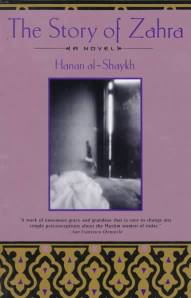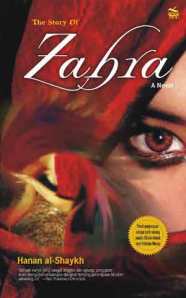Wow, this was a difficult book to read! One of those books that can make you feel depressed even when your own life is full of ducklings and ice cream cones. In the end though, I think I’ve gotten something important from reading it.
The first half of The Story of Zahra by Hanan al-Shaykh reminded me a lot of the first half of Woman at Point Zero. In both, the heroine just keeps on being mistreated by one person after another- their parents, their relatives, their lovers. It’s completely relentless. Actually Woman at Point Zero was the more uplifting of the two, which is remarkable since its premise is that it is the story of a prostitute who is about to be executed for murder.
In my reading for my book-from-every-country project so far I feel like I’ve had a hard time with most of the Arabic literature that I have tried. (I’m including The Women of Algiers in their Apartment in that group, even though it was originally written in French.) I don’t know to what degree I’ve happened to choose difficult books or if there really is something particularly challenging about Arabic literature in translation. I read a useful comment this week in the blog Arabic Literature (In English) that Arabic books aren’t just being translated from another language, but also from another literary tradition. That may be part of what is challenging me.
Even when it comes to the first problem of being translated from another language, Hanan al-Shaykh seems to like to make things difficult for her readers. I actually found an interview where she was asked about translating her work and she said,
“Sometimes, even the translator would say, ‘Hanan, they [the readers] wouldn’t know.’ And I say, ‘Well, let them search.’ I wouldn’t bend only for the sake of the reader.”
One example of this that happened to particularly bug me was a several paragraph description of how Zahra as a child was avoiding figs on a trip back to her home village because a neighbor had told her, “You are going to pick figs and get red eyes”. When she repeats this to another adult they laugh in a way that implies there is some sort of double entendre to the statement, but it’s certainly not one that I’m able to understand. Googling didn’t help me out and I even went so far as to ask a Lebanese friend about it. He thought that maybe fig picking was some sort of reference to the affair that Zahra’s mother was having, but even he was confused.
Surely there could have been some way of clarifying this in the translation? If nothing else a footnote explaining what the double meaning would have been in the original Arabic? Instead, as a result of some sort of stubborn purism on the part of the author, the book is left with a whole page that really doesn’t make much sense.
The other thing that made The Story of Zahra a challenging read for me was that Zahra just seemed so hard to relate to. I felt sorry for her, but I didn’t much like her. She just seemed so passive about letting things happen to her. Such as getting into and then continuing a relationship with a married man even though she had no interest in him whatsoever. Or just generally trying to avoid her problems by hiding in the bathroom.
I tried to be understanding though. Zahra had been through a lot. The combination of her experiences and the society lived in had traumatized her into someone who tried to escape her problems, rather than face them. I thought that was actually the point of the book.
Then I read more of that interview with Hanan al-Shaykh. She said:
“I never thought, like the readers thought, that Zahra is hopeless. I mean, according to the West, she was very hopeless, she couldn’t do anything. But in her own society, she tried to really say no, like even going to Africa, spiting her father in telling him that, although she was not beautiful, beauty wasn’t everything.”
I was completely wrong.
Zahra wasn’t supposed to be a woman pummeled into submission! She was supposed to be a woman who kept resisting! My own, Western, view of what it means for a woman to be assertive got in the way of understanding Zahra’s story. I saw Zahra as passive because she didn’t face her problems head on, but instead always kept running away. But to Hanan al-Shaykh, Zahra had strength because she kept running away, because she never resigned herself to her situation.
I feel simultaneously encouraged and discourage by this realization. I’m encouraged because this is exactly the kind of thing that I want to get out of my book-from-ever-country project. I wanted to gain new perspectives and understand other ways of seeing the world. But at the same time I’m discouraged because I wouldn’t have realized any of this just from reading the book itself. It is only because I happened to come across that interview with the author that I was able to get beyond my own way of seeing things. What else have I missed because I didn’t quite ‘get it’?
So, with that in mind here are my recommendations for reading The Story of Zahra:
- Before you read, do some background reading on the Lebanese Civil War. I’ve totally ignored it in this post, but the civil war plays a big role in the second half of the book and you might not be surprised to learn that al-Shaykh doesn’t really give any explanation of what’s going on. I think you can understand the book just fine without knowing more, but it would enrich your reading experience to have a bit of background.
- Try to keep an open mind while reading. If you’re a Western reader, remember that it is not a book that was written with you as the intended audience.
- After you are done reading, check out this page which has the interview with Hanan al-Shaykh and also some interesting biographical information. (It’s intended as an exercise for high school students before reading this book. I think it gives a bit too much away to read beforehand though.)
- If you figure out what the deal is with the figs and the red eyes, do let me know!
Given my recent post about stereotyped book covers, I couldn’t bring myself to use the American cover of The Story of Zahra as the lead image for this post:
I imagine the conversation at the publisher’s: “A book about a Middle Eastern woman who doesn’t wear a veil? No mention of a headscarf whatsoever? Okay, we’ll just cover her face with her hair instead. What? She’s supposed to have acne scars all over her face? Never mind that, we’ll just show her with perfect skin.”
To give the American publisher some credit, the Italian and Indonesian covers are far worse:





Bad covers not one I’ve come across my favourite writer from is Elias Khoury
By: winstonsdad on June 4, 2014
at 2:59 am
I’ve heard good things about Elias Khoury. I’ll have to put him on my list of writers to get back to!
By: biblioglobal on June 4, 2014
at 8:54 am
Thank you for discovering what I missed. I also read globally to experience new perspectives, but I missed Zahra’s. The idea that she is resisting in the only way she can helps. But even if she doing the only things she can, her acts seem self destructive. I still find her and her culture self destructive.
Your comment about Arab books being depressing is interesting. I’ll look back over the ones I have read and think about what you said. Arab books or Arab books by women?
By: mdbrady on June 4, 2014
at 11:07 am
Besides being depressing, the Arabic books I’ve read (in general, not just by women) have also just been difficult to understand. I frequently feel like there is a lot that I am missing. I don’t know if it’s just a function of the books I happen to have chosen though.
I do agree about Zahra’s self-destructiveness.
By: biblioglobal on June 4, 2014
at 2:58 pm
The Arabic books that I have read also tend to be depressing, too, or at least include some tragic elements. Like you, I haven’t read enough to really know if I have read a fair sample. I do see a few exceptions. Leila Aboulela writes books that are not exactly happy, but do end with a bit of hope. Leila Ahmed is an historian who has written what I think is the best book on women and Islam and has also written a fine autobiography of growing up in Egypt. She is depressing, perhaps because she is now outside the region.
By: mdbrady on June 5, 2014
at 11:38 am
I remember reading a book recently that was set against the backdrop of the disintegration of the Ottoman empire. There was a lot of the actual politics that was hinted at in the book and used as a means of sarcasm, but because I didn’t know any of it, all that went over my head. Looks like this is the same thing here. I do like the sound of this book and its premise, but I’ll probably chalk it up for more advanced reading, once I’m more familiar with this country. Right now, my big challenge is still finding books from these countries that aren’t depressing. Normally I wouldn’t mind so much, but I’m going through a phase now when I’m not in mood for anything very deep or profound. Great review!
By: Athira on June 4, 2014
at 8:22 pm
Thanks! I don’t want to discourage people from reading The Story of Zahra, but I’d definitely say that it isn’t what you are looking for right now. If you haven’t read it, you might enjoy Lyrics Alley by Leila Aboulela. I really enjoyed it and I’d describe it as substantive without being depressing.
By: biblioglobal on June 5, 2014
at 5:42 pm
This one sounds like a brutal read. I’m glad you got something out of it, though. Based on the quote in your post, ithe author seems to have an interesting attitude toward her readers. I don’t know how I feel about that. I understand that it’s art, but it’s also entertainment (though maybe this novel isn’t!).
PS. I really wanted to name my youngest daughter Zahra, but I have too many relatives with that name. We settled on something close to it.
By: A.M.B. on June 17, 2014
at 12:12 pm
I like the name Zahra also. I wouldn’t name someone after this Zahra though!
I’m not sure how I feel about the author’s attitude either. I want to say that being deliberately obscure is not the same as art. But that seems overly closed minded of me.
By: biblioglobal on June 17, 2014
at 11:06 pm
[…] Story of Zahra by Hanan Al-Shaykh (Lebanon)- I didn’t like this book at all, but I ended up learning from the experience of […]
By: Looking back: Reading (Global) Women in 2014 | Biblioglobal on February 5, 2015
at 5:58 pm